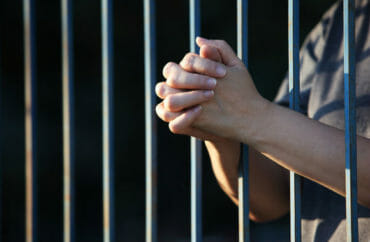
Building on momentum from criminal justice reform law
Christian colleges often live in fear of Democratic lawmakers, some of whom view their religious beliefs on sexuality as a reason to deny them government-based financial aid.
But sometimes the two sides can find common ground.
The Council for Christian Colleges & Universities has played a pivotal role in building support for federal legislation that would reopen Pell Grants to incarcerated students in “Federal and state penal institutions.” House and Senate Democratic lawmakers, joined by a few Republicans, introduced bills to that effect Tuesday.
The Restoring Education and Learning Act has been offered in previous sessions of Congress. These bills coincide with President Trump’s designation of April as Second Chance Month, which focuses on rethinking prison and criminal justice policies.
It would overturn a federal ban on Pell Grant eligibility for prisoners dating back to the 1994 crime bill signed by President Clinton, The Chronicle of Higher Education reported. If signed by Trump quickly, it would take effect in the academic year starting this fall.
Other Christian organizations have been instrumental in the push for the REAL Act, particularly Prison Fellowship.
In a statement last week, the CCCU said it spent the past year advocating with Prison Fellowship, the Southern Baptist Convention’s Ethics and Religious Liberty Commission and U.S. Conference of Catholic Bishops to “increase access to educational and faith-based programming in prisons.”
They are hoping to replicate their success with another criminal justice reform bill, the FIRST STEP Act, signed into law by President Trump in December.
Last year’s REAL Act, also sponsored by Democratic Sen. Brian Schatz, never reached a vote in either chamber, CCCU spokesperson Greta Hays told The College Fix in an email.
According to the CCCU, “Prison Fellowship and the CCCU have made expanding Pell Grant eligibility to incarcerated students our organizations’ priority in Congress.”
They see prison education advocacy led by Congress as a catalyst for a string of social benefits for prisoners, their families and society at large.
MORE: California’s LGBT mandate discriminates against Christian colleges
More than a dozen @cccuorg schools offer edu opportunities to incarcerated individuals, incl @Baylor, @CalvinCollege, @GreenvilleUniv, @HoughtonCollege, @lipscomb, @NPU, @NyackCollege (photo cred), @SamfordU, @TIU, @WarnerPacific, @WheatonCollege, @YorkCollegeNeb. #SecondChances pic.twitter.com/h44d7fAipk
— CCCU (@cccuorg) April 5, 2019
43 percent ‘less likely to recidivate’
The council, which represents more than 180 Christian colleges across the globe, has a history of backing prison reform policies as well as conducting community service in correctional facilities, such as prisoner higher education programs.
It was active in last year’s push for the FIRST STEP Act, a broad starting point for prison and criminal justice reform in general. The law provides programs “to help reduce the risk that prisoners will recidivate upon release from prison.”
The bill was supported across the political spectrum, from the American Conservative Union to the ACLU. A bipartisan group of senators, including Republicans Chuck Grassley and Mike Lee and Democrats Dick Durbin and Cory Booker, played roles, and President Trump and senior adviser Jared Kushner were vocal in their advocacy.
But the FIRST STEP Act’s coattails did not extend to the REAL Act, despite a push by CCCU and Prison Fellowship a year ago.
Advocates previewed the legislation with The Fix before it was introduced Tuesday, though it does not appear to have been posted on Congress.gov as of Tuesday evening.
Prison Fellowship’s Heather Rice-Minus gave credit to several lawmakers on both sides of the aisle, including lead House sponsor Danny Davis, a Democrat from Illinois. Democrat Barbara Lee of California and Republicans Jim Banks of Indiana and French Hill of Arkansas are cosponsors.
Rice-Minus told The Fix in an email that Bobby Scott of Virginia, chair of the House Education and the Workforce Committee, has worked directly with Prison Fellowship and Davis on the issue. Scott “has long been a leader on criminal justice reform and is supportive of expanding education opportunities to people in prison.”
MORE: CCCU endorses LGBT protections in federal law
Do you believe in #SecondChances? Promote #SecondChanceMonth throughout April using our Social Media Toolkit, with ready-to-share messages and statistics to help spread the news about the importance of second chances. #WeBelieveInSecondChances https://t.co/hVZGVsgpgT pic.twitter.com/QDgAr0Cf65
— Prison Fellowship (@prisonfellowshp) April 10, 2019
Several advocates of the bill point to a study by Georgetown Law’s Center on Poverty & Inequality and the Vera Institute of Justice. It found that 9 percent of individuals released from prison hold a post-secondary education, while more than 70 percent of incarcerated men and women say they want to study while in prison.
CCCU believes “education can be a driving force in propelling [prisoners] toward a successful reentry into society,” according to its statement. It cited a recent RAND study that found incarcerated individuals in education programs are 43 percent “less likely to recidivate,” and 21 percent “more likely to gain employment upon release.”
From a fiscal perspective, the Christian higher education organization cited a Vera study that claimed reversing the Pell Grant ban “could reduce incarceration costs by $356.8 [million] each year.”
Other organizations that have endorsed the REAL Act include the American Bar Association, ACLU, NAACP and dozens more, according to the office of Schatz, the bill’s sponsor in the Senate.
MORE: Schatz wants to strip federal money from unaffordable colleges
IMAGE: sakhorn/Shutterstock
Like The College Fix on Facebook / Follow us on Twitter






Please join the conversation about our stories on Facebook, Twitter, Instagram, Reddit, MeWe, Rumble, Gab, Minds and Gettr.